Manufacturing Employment Stays the Same
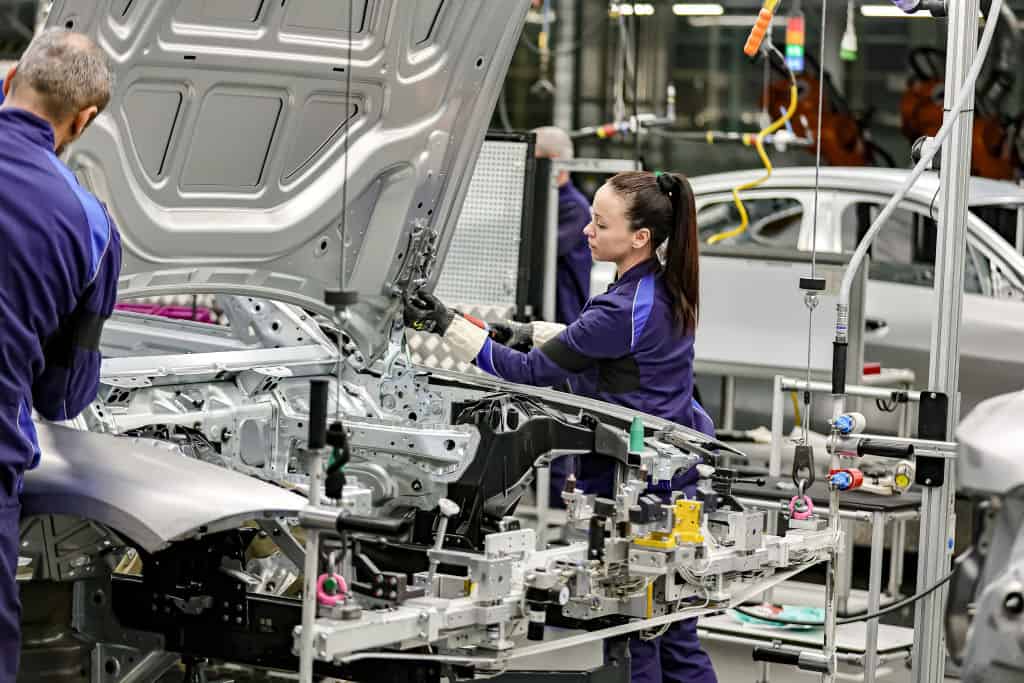
Employment in manufacturing remained essentially the same in April as it was in March, according to data out today from the U.S. Bureau of Labor Statistics.
- Overall employment increased by 175,000.
What’s going on: Manufacturing employed a seasonally adjusted 12,961,000 workers in April, up just marginally from 12,953,000 in March and 12,957,000 in February.
- The number of people employed in manufacturing was also up only slightly from April 2023, when it was a seasonally adjusted 12,941,000.
Durable goods vs. nondurable: There were a seasonally adjusted 8,144,000 workers in durable goods manufacturing in April, flat from March’s number.
- Nondurable goods had a seasonally adjusted 4,817,000 employees, also essentially unchanged from the prior month.
Workweek: The average workweek in the manufacturing industry was unchanged from March, at 40.0 hours.
- In the larger economy, the workweek for all nonfarm employees inched down by 0.1 hour in April, to 34.3 hours.
Earnings: Average earnings in manufacturing were also little changed from March to April, coming in at $33.61 an hour in the latest reading, down only slightly from $33.65, but up from February’s $33.44.
Manufacturing Job Openings Decline
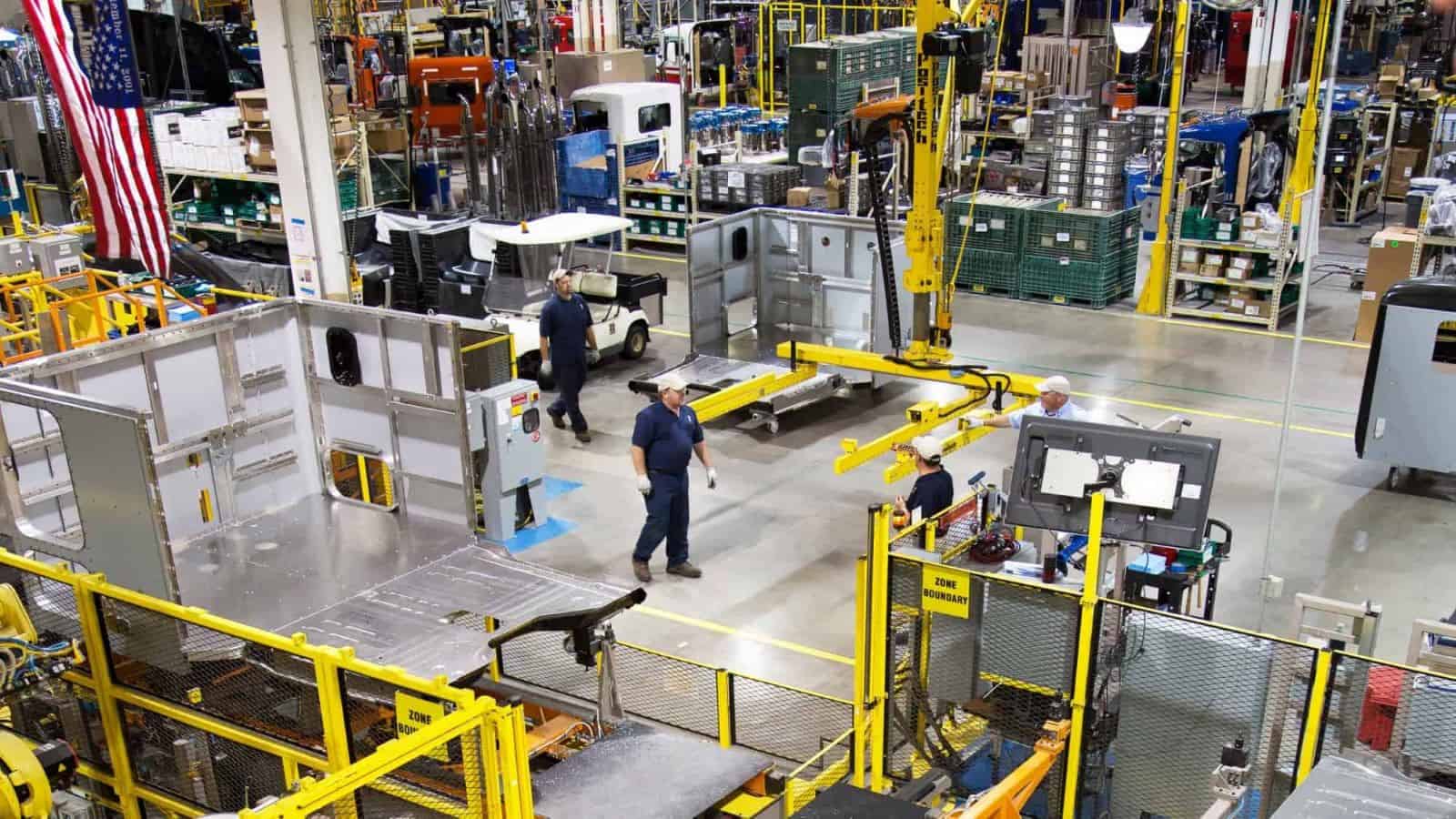
The number of U.S. job openings in manufacturing decreased in March, according to new data from the U.S. Bureau of Labor Statistics.
- Meanwhile, the number of job openings in the larger economy remained about the same, at approximately 8.5 million.
What’s going on: There were 570,000 open positions in the U.S. manufacturing industry in March, down from an adjusted 587,000 in February.
- Open positions in durable goods manufacturing also declined, to 353,000 in March from an adjusted 379,000 in February.
- Openings in nondurable goods, however, inched up to 217,000 from an adjusted 208,000.
Hires and quits: Hiring in the sector remained about the same as the last reading, coming in at 323,000 in March (down marginally from February’s 324,000).
- Total separations—which include quits, layoffs, discharges and other severance of employment—decreased slightly in March (to 330,000) from February (an adjusted 338,000).
The MI Honors 2024 Women MAKE Award Winners
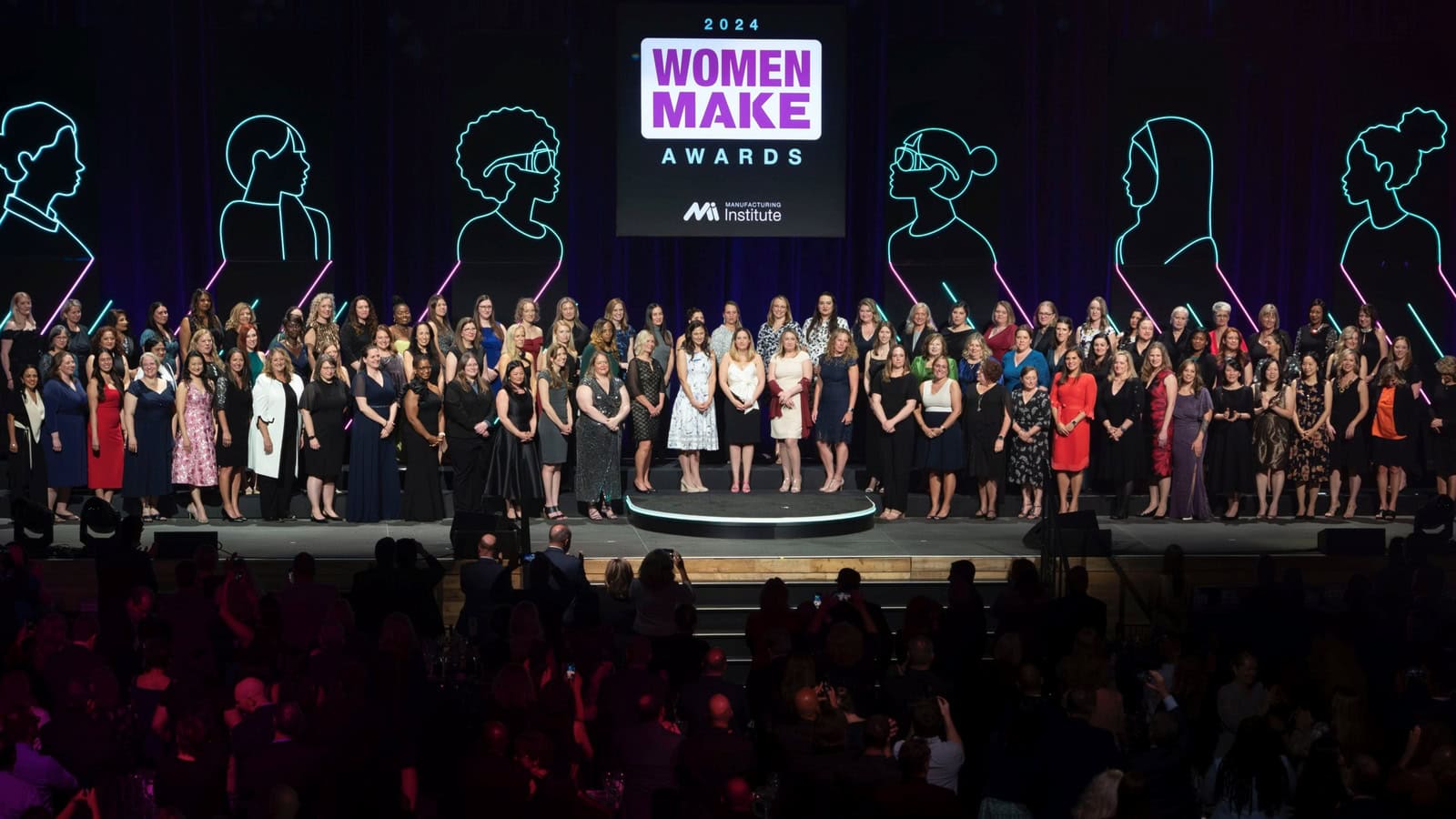
The Manufacturing Institute—the NAM’s 501(c)(3) workforce development and education affiliate—had ample reason to celebrate last night.
What went on: The MI held the 2024 Women MAKE Awards gala, a night that recognizes outstanding women in manufacturing. Each year, the awards pay special tribute to 100 peer-nominated women leaders (“Honorees”) and 30 rising female stars (“Emerging Leaders,” women under the age of 30) in the industry.
- The event, held this year at The Anthem—a waterfront concert venue in Washington, D.C.—was sponsored by Caterpillar, Toyota, BASF, Trane Technologies, International Paper, Johnson & Johnson, Novelis and others.
- It featured a vocal performance by singer Loren Allred, platinum-selling singer-songwriter of “Never Enough” from “The Greatest Showman” musical, who gained widespread fame after appearing on “Britain’s Got Talent” in 2022.
What was said: Caterpillar Group President of Resource Industries, NAM Executive Committee Member and Women MAKE Awards Chair Denise Johnson told the night’s award winners that she’s been “the only woman in a room, or the only woman on a project” many times in her career.
- But “[l]ooking around this theater and seeing the faces of the Honorees and Emerging Leaders tells me that times are changing.”
- She then addressed the honorees directly, saying, “Your success, your work ethic and your stories will inspire the next generation of manufacturing leaders. … You are moving us along toward a future when women are not underrepresented in our industry.”
From Honoree to Vice Chair: Toyota Motor North America Senior Vice President, Electric Vehicle Supply Susan Elkington—a 2014 Honoree of the awards, formerly called the STEP Ahead Awards—was this year’s awards vice chair. She attested to the power of the awards to help women advance in their careers.
- “[T]he Women MAKE network … helped me realize the many qualities and experiences uniting all the women who have been inducted into this amazing network.”
- She noted the cruciality of the MI’s Women MAKE initiative, which “provides a platform for role models and mentors to encourage women to enter the field and succeed in it.”
No limits: NAM President and CEO and MI Chairman of the Board Jay Timmons also discussed the importance of role models, a label aptly applied to all the award nominees.
- Timmons, a parent of three, told the audience that he and his children recently learned the story of 30-year-old Cole Brauer, who last month made history as the first American woman to sail solo nonstop around the world.
- Brauer’s story “sends a message to those—frankly, women or men—who might have been led to believe there were limits to what they could achieve or that their careers might be confined within guardrails,” he said. “Your examples are inspiring people in a similar way. You are powerhouses—your dynamism, your drive, your enthusiasm—all these qualities supercharge modern manufacturing, making our industry an even more powerful force for good.”
“Amazing things”: MI President and Executive Director Carolyn Lee called the nominated women “powerhouses who have accomplished amazing things.”
- “You deserve this recognition for your excellence and for everything you do to uplift others,” Lee told the award nominees. “But we’re not just celebrating. Being here to recognize these winners is shining a light and fueling the work to close the gender and talent gap in manufacturing.”
- Women account for less than one-third of the American manufacturing workforce, she went on, but endeavors such as the MI’s Women MAKE America initiative—the nation’s premier program dedicated to closing the gender gap in the sector—“and companies like yours are committed to closing that gap.”
Learn more: For a full list of this year’s award winners, click here.
From Mentee to Mentor: Rockwell Automation’s Aaliyah Brown
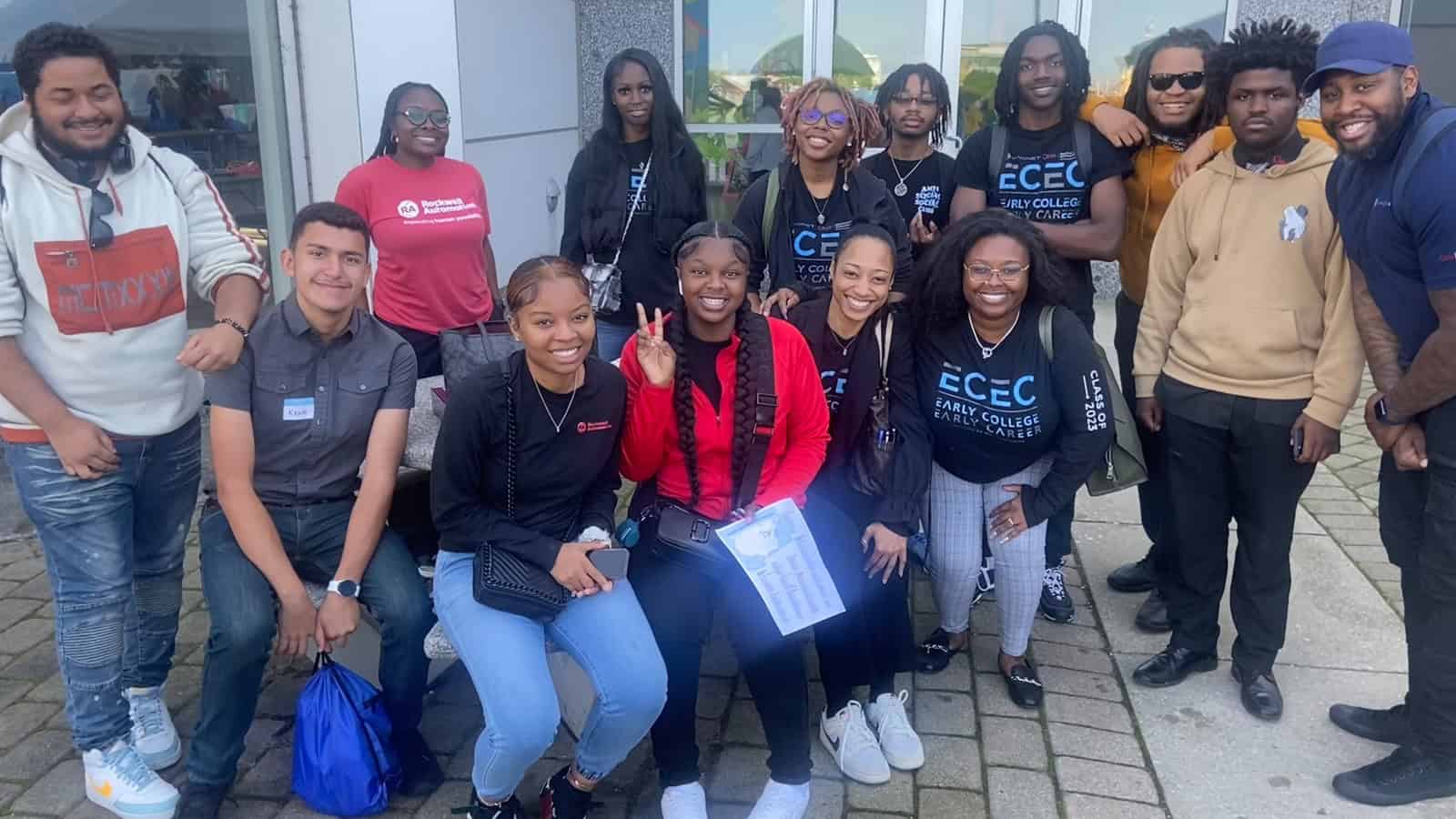
To hear Aaliyah Brown tell it, the start of her career in manufacturing was the result of a happy accident.
“My interest in manufacturing actually started accidentally,” the Rockwell Automation quality engineering team lead said with a laugh. “I was hired as a high school intern [at age 16]. I had a lot of different positions within my role, from [learning] how our different products are utilized in the field, to project management, to printed circuit board design. That’s when I really started to dip my toe into manufacturing.”
A quick ascent: After obtaining her bachelor’s degree in electronic engineering technology from Cleveland State University in 2019, Brown—who works at Rockwell Automation’s Twinsburg, Ohio, location—was hired full time by the automation and digital transformation technologies company as a process engineer.
- Three years later, she was made a quality engineer. Just a year after that, she was promoted to quality team lead.
- Her meteoric rise is one of the reasons her colleagues nominated her for this year’s Women MAKE Awards, honors given annually by the Manufacturing Institute, the NAM’s 501(c)(3) workforce development and education affiliate, to women in manufacturing who have accomplished remarkable successes at their companies.
The elevator speech: Her day-to-day job may be complex, but for the layperson, Brown can break down her duties in just a few sentences.
- “Manufacturing quality can be explained as anything that goes wrong within a manufacturing facility,” she said. “My team has to figure out why it happened and how to fix it to make sure it does not happen again.”
Paying it forward: Brown credits a great deal of her early professional success to mentor and colleague Marzell Brown (“no relation whatsoever”), a talent management lead at Rockwell Automation.
- Like Brown, Marzell Brown is a graduate of the Cleveland Metropolitan School District. Years ago, seeing a lack of programs in the greater Cleveland area designed to expose youth from traditionally underrepresented communities to science, technology, engineering and math careers, he helped found Brown’s alma mater, Cleveland’s MC2 STEM High School. Later, he spearheaded the internship program at Rockwell Automation’s business engineering unit that Brown completed.
- “Before I started going to summer camp at a private school, I had no idea what an engineer was,” Brown continued. “No engineers were in my family at the time. I was in the second graduating class of MC2 and about, I think, the seventh cohort of students Marzell brought in.”
- Inspired by her own experiences, in 2017—while still in college—Brown founded the nonprofit Build Sessions CLE, a mentorship initiative for college-bound STEM students from underrepresented communities.
- “All of the wonderful things that Marzell did for me and others like me, all of those best practices, those are what I brought over” to my job and to Build Sessions CLE, she said.
Changing perceptions: Brown—who helps lead Rockwell Automation’s annual Manufacturing Day events—believes that if more young people knew what modern manufacturing was really like, they would be much more inclined to enter the field.
- “I want to reach back … into these high schools, to provide these students with the great opportunities [I had] and show them that, yes, you can be successful here, and manufacturing facilities aren’t dirty and dingy,” she said.
Calling all women: She knows, too, the importance of shoring up the percentage of women in manufacturing in the U.S., which is around 30%.
- And there’s encouraging news on that front from the Rockwell Automation internship program that launched Brown’s career: If current trends continue, the number of women coming into the company from that program is going to rise, she told us.
- “[To all the] young ladies who don’t know exactly what they want to do, but have interests—say, sewing or project management or just wanting to help people— there are ways to be able to use all of those” talents in manufacturing, Brown said. “And you can have a very lucrative career here.”
“Why Inclusion Matters”: GM’s Stephanie Thompson on STEM, Women in Manufacturing
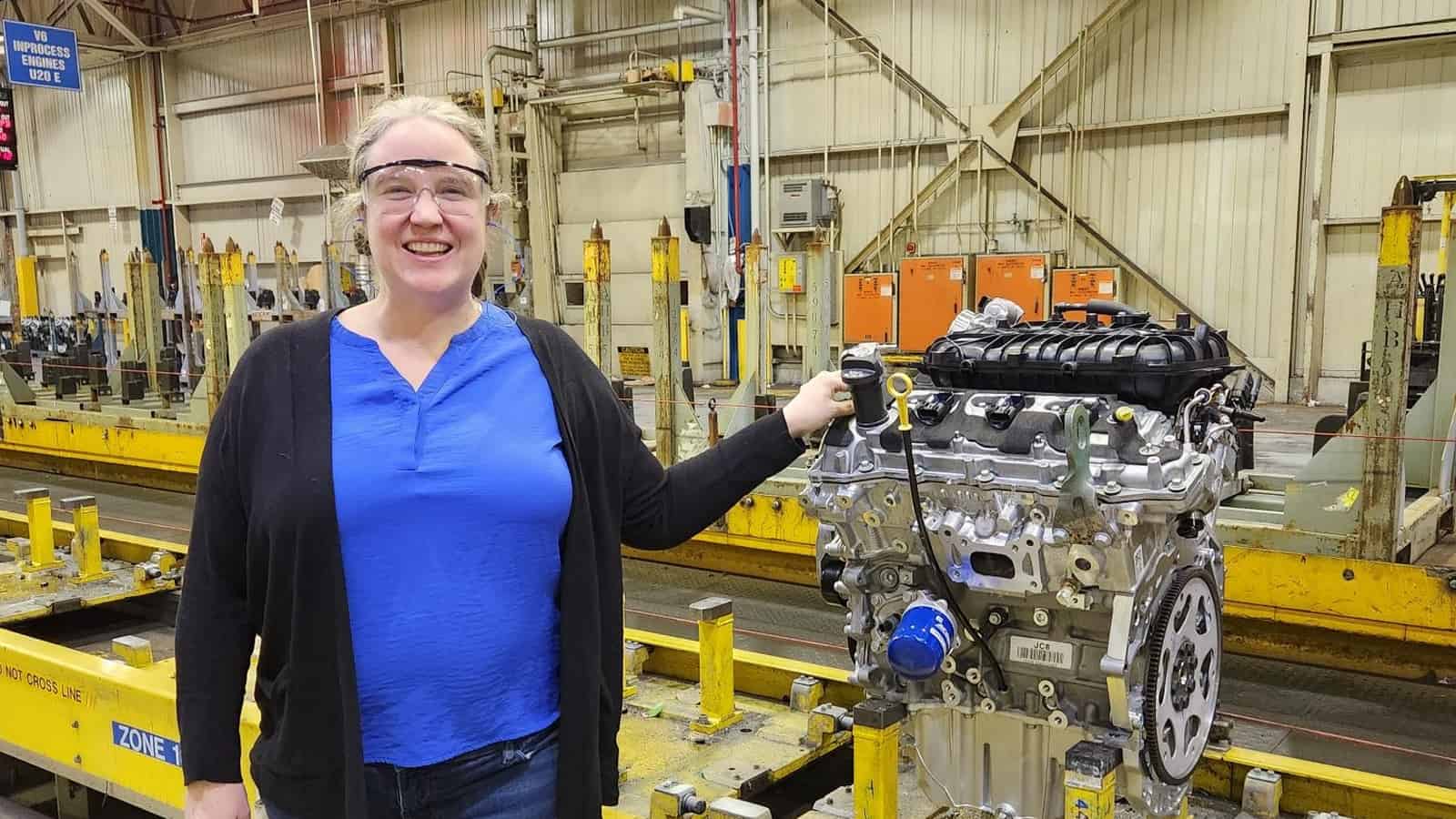
Stephanie Thompson may not have always intended to go into manufacturing, but she’s very glad she did.
The path taken: “You don’t necessarily plan your journey, but sometimes you can look back and see how those paths presented themselves,” and you’re thankful they did, said the engineering manager at General Motors’ facility just outside St. Catharines, Ontario, Canada.
- “My career in manufacturing started in internships in university. I worked for a food manufacturer, for a company that made above-ground swimming pools … It was a great chance to try out different businesses, and I [realized that I] love the buzz and excitement that manufacturing has.”
Award nominee: Thompson is a 2024 Honoree of the Women MAKE Awards, honors given annually to 130 women making a difference in manufacturing by the Manufacturing Institute, the NAM’s 501(c)3 workforce development and education affiliate.
- Thompson—who started working for GM full time right after university and has held multiple positions in her 23 years there—was the first woman to become an engineering manager in her time at her site.
- Women MAKE Award winners will be celebrated April 18 at the 2024 Women MAKE Awards Gala in Washington, D.C.
Always improving: An Ottawa native and graduate of the University of Waterloo, Thompson sums up her very complex job as “a manufacturing assembly specialist [who] makes sure people can do their jobs safely—and do it over and over again.”
- She oversees the assembly of whole powertrain lines. For one particular engine, “I was there for the first one made, and I was here for the last—we made over 5 million,” she said of a recently retired line.
- “We are always looking to make improvements, to make things more cost effective, to make things simpler,” she said. “The problem-solver part of me really enjoys making those incremental differences every day. [In manufacturing,] you get that sense of satisfaction from making stuff and ultimately giving a customer what they want.”
Women in STEM: Thompson, who has been recognized several times in her native Can
ada for her commitment to women’s education in science, technology, engineering and math, somehow found the time a few years ago to launch STEMbySteph.com, a STEM-focused website that includes a workshop series for women in the fields.
- She is also a mentor for FIRST Canada, which aims to interest kids in science and technology, and a regular speaker on related topics.
- “There are so many great women coming up through the ranks” in manufacturing today, she told us. “I want them to know there isn’t a limit to what they can do. I want to put myself out there as a technical role model, so women who apply [for manufacturing and STEM jobs] see themselves on the interview panel. They should know there’s a space for them in manufacturing.”
Work in progress: And while she’s had “nothing but great experiences with the men in manufacturing,” Thompson said the industry as a whole could benefit from “having some conversations” to make sure women feel welcome.
- “I don’t think it’s malicious,” she said, of the relatively low number of women in manufacturing (they make up about 30% of the
manufacturing workforce). “But one of the things you have to do as a leader is create intentionality and create environments where conflict is positive, where you can all create ideas to [fix] the problem and where individuals feel safe being themselves.”
Study: Manufacturing in U.S. Could Need Up to 3.8 Million Workers
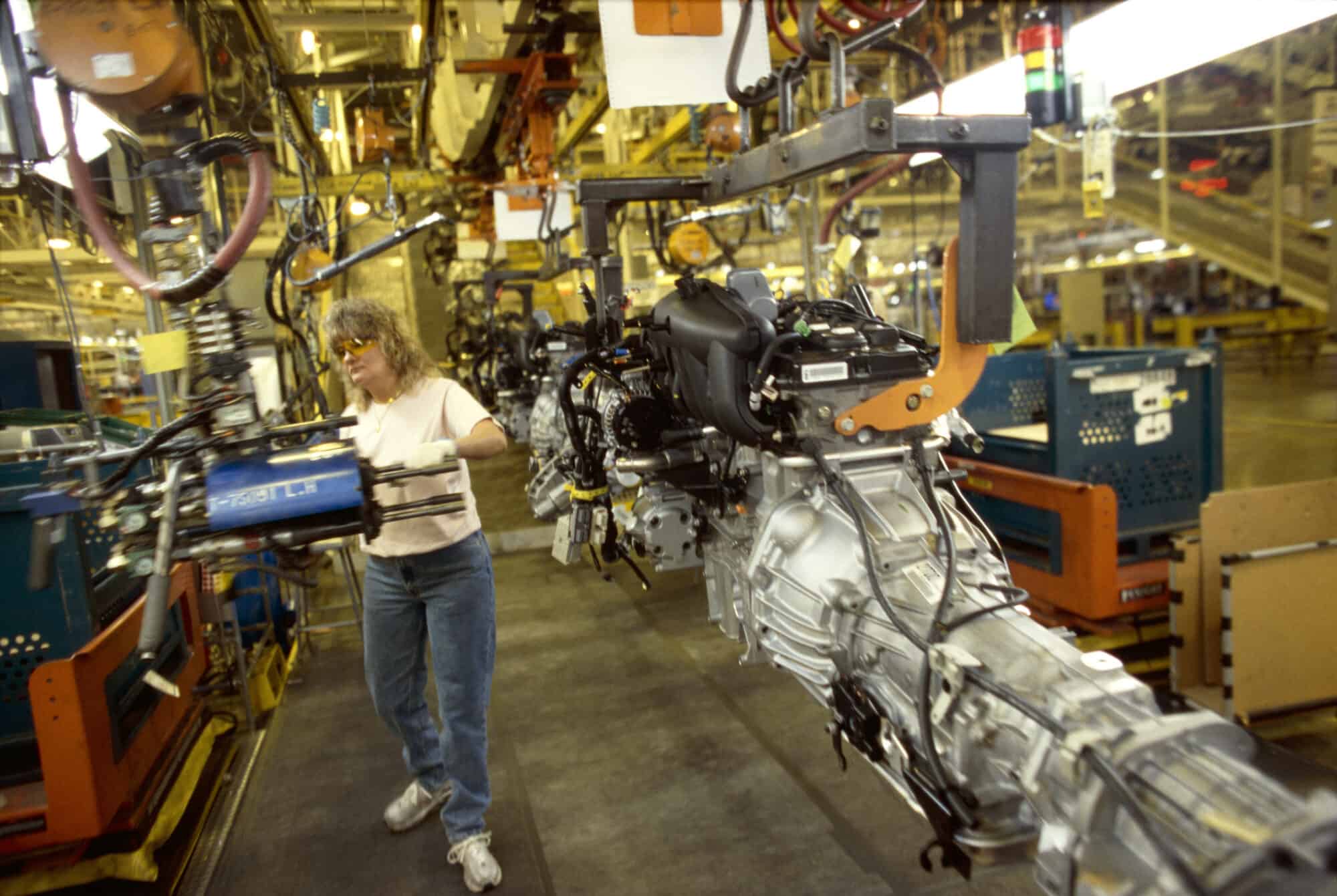
The U.S. manufacturing industry could require some 3.8 million jobs to be filled within the next decade, according to a new joint study from the Manufacturing Institute, the NAM’s 501c3 workforce development and education affiliate, and Deloitte.
What’s going on: “Taking charge: Manufacturers support growth with active workforce strategies” found that manufacturing in the U.S. has emerged from the global pandemic on strong footing and is likely to continue to grow in the next few years.
- That growth will call for even more skilled workers—particularly statisticians, data scientists, logisticians, engineers, computer and information systems managers, software developers and industrial maintenance technicians—spotlighting the need to build the national talent pipeline.
- “Pandemic-driven shifts have already created hundreds of thousands of new jobs, and now we are seeing increased demand for digital skills that need to be met or risk further widening of the talent gap,” said Manufacturing Institute President and Executive Director Carolyn Lee.
Key findings: Top takeaways from the report include:
- If workforce challenges are not addressed, more than 1.9 million of the up to 3.8 million jobs likely to be needed between this year and 2033 could go unfilled.
- Some 65% of manufacturers polled said attracting and retaining talent is their primary business challenge.
- About 90% said they are forming at least one partnership to better attract and retain employees, and on average they have at least four such partnerships.
- Approximately 47% indicated that apprenticeships, work study programs or internships at manufacturing companies would be the most effective way of increasing interest in the industry.
- Some 47% also said flexible work arrangements—such as flex shifts, shift swapping and split shifts—have been their top retention tool.
The bottom line: Manufacturers continue to face a talent shortage—and the MI has the initiatives and resources ready today to help manufacturers address these challenges.
- From the recent flexibility white paper—which explains how manufacturers can build and deploy flexibility options for the 49% of workers that are on the production teams—to the high school internship toolkit that allows manufacturers to start a recruiting pipeline in high schools, to the FAME USA apprenticeship program training global best multi-skilled maintenance technicians and more, the MI has solutions to the hurdles highlighted in this study. Learn more at themanufacturinginstitute.org.
How Pioneer Service Solves the Retention Puzzle
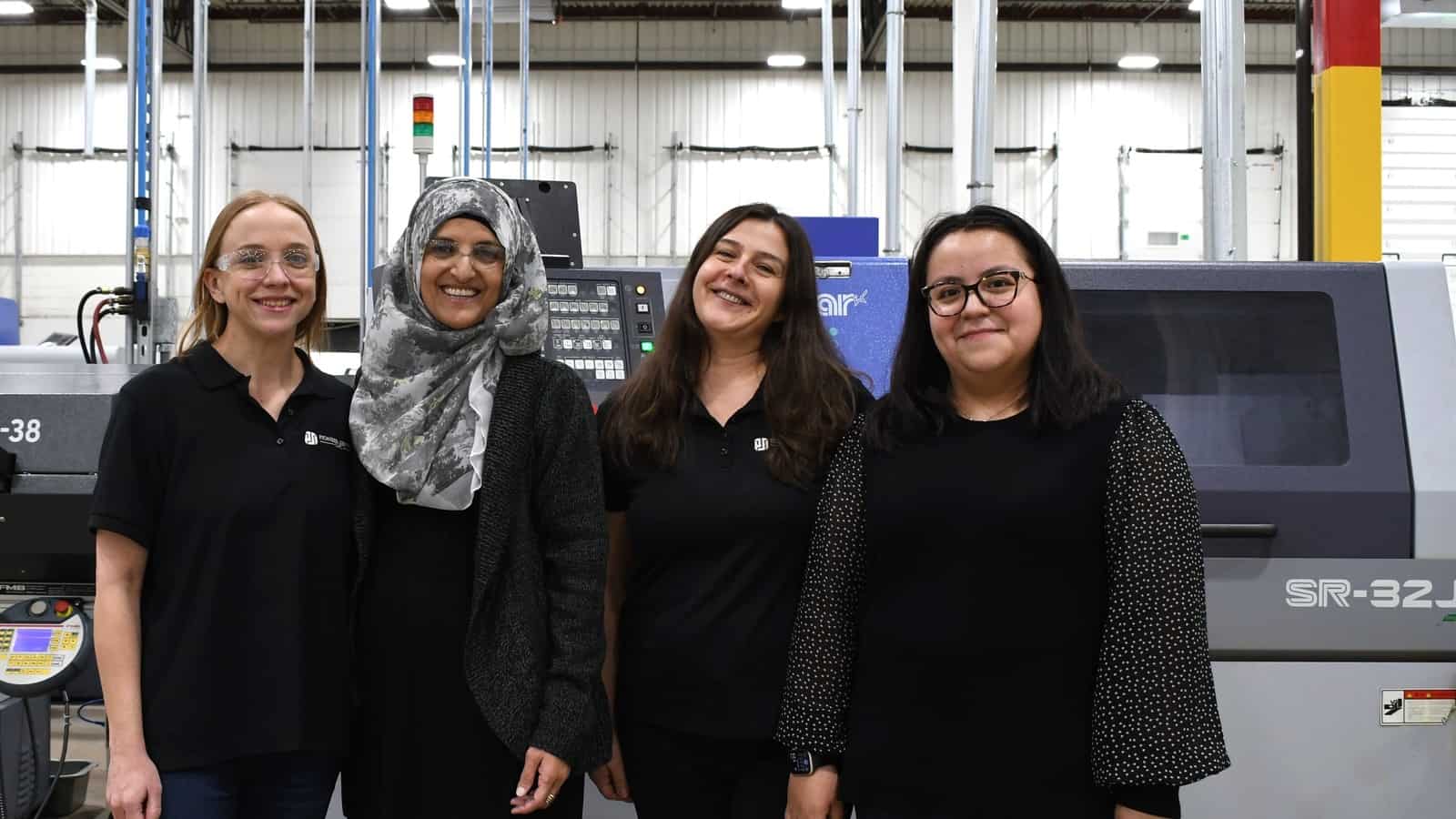
For Pioneer Service President and Co-Owner Aneesa Muthana, having an engaged team is the key to solving the workforce retention puzzle. The Addison, Illinois–based, woman-owned company is among the many manufacturers that find retention, along with recruitment, to be top business challenges, as the NAM’s Manufacturers’ Outlook Survey shows. So how has Muthana gone about building such a team?
Where it all starts: For Muthana, meeting this challenge begins with upholding the company’s core values: integrity, diversity, leadership, outreach, stewardship, quality and learning.
- These words appear on the shop floor, and every job candidate who comes in for an interview receives a handout outlining their importance. “These are more than just pretty words on a wall,” said Muthana. “We chose these values as a team because they pinpoint our path to success, both financially and ethically.”
- “I give them a copy because I want them to understand the importance from the beginning,” said Muthana. “We want to plant the seed before they’re on our payroll that these are the expectations. Then it becomes fair to hold people accountable to them.”
Providing training opportunities: In keeping with its core values of stewardship and learning, Pioneer Service offers internal training opportunities for employees who express an interest.
- “We offer training to anyone who raises their hand, whether it be in safety or leadership,” said Muthana. “It can also be very technical training on the shop floor. We also provide GD&T training, including for our sales team.”
- GD&T, or geometric dimensioning and tolerancing, determines how parts fit together into an assembly to form a product.
- The benefit of having a salesperson learn about GD&T? “A salesperson would be able to look at a customer print confidently and feel comfortable talking to the customer without needing to have an engineer in the room,” Muthana pointed out.
Offering support: Pioneer Service established a chaplaincy program, which connects employees and their families undergoing hardships—such as caring for an elderly parent, grieving the loss of a loved one or dealing with a personal struggle—with a chaplain who can provide counseling and offer spiritual and emotional support. Muthana says that the chaplaincy program is open to any employee, regardless of religious background or preference.
- “The chaplain service is part of our team,” said Muthana. “We have one chaplain come in every week—one week a male and then the following week a female—who is available to meet with staff if needed.”
- Muthana says she used the service a few years ago when her son, who is in the military, came back from Afghanistan. Many of his friends did not.
- “As a parent, you feel grateful that your child survived, but also guilty for feeling that way because a lot of his friends didn’t come home. The chaplain service provided me someone to talk to because I couldn’t talk to my family, and I couldn’t talk to my staff,” she recalls. “I developed a strong relationship with the chaplain that I feel never would have happened if I didn’t look out for my staff and implemented the service.”
Job shadowing: When Muthana goes to a speaking event or conference, she sometimes takes one or two of her staff with her so they’re able to benefit from attending. It’s also a way for her to get to know her staff on a more personal level, outside of the formal workplace setting.
The last word: Muthana shared some advice for companies struggling with workforce retention:
- “Having an engaged team and workers only happens with a people-first mentality,” said Muthana. “When you take care of them, you become successful because you have an engaged team that has your back.”
- “It’s harder to make a profit than ever. The only way that we’re going to be successful is by having an engaged team.”
Go deeper: The Manufacturing Institute (the NAM’s workforce development and education affiliate) has many resources to help employers retain and develop their teams.
- Start with this study to learn how to build positive company culture and engage employees, explore strategies in boosting retention and employee engagement, delve into tips on attracting and retaining talent in rural vs. urban settings and check out the MI’s recent white paper on flexibility approaches for manufacturing production workers, a key tool to improving the employee experience.
- Pioneer Service’s approach to workplace needs exemplifies the benefits of focusing on the holistic frontline employee experience, which include higher retention, less absenteeism and greater engagement, according to a study conducted by the MI and PwC.
- Learn more about Women MAKE America and the 35×30 campaign, the MI’s initiatives to increase the number of women in manufacturing, tapping into this population to address persistent workforce shortages. Military-affiliated talent and second chance populations are great sources, too.
Three Sisters Build Manufacturing Careers Together
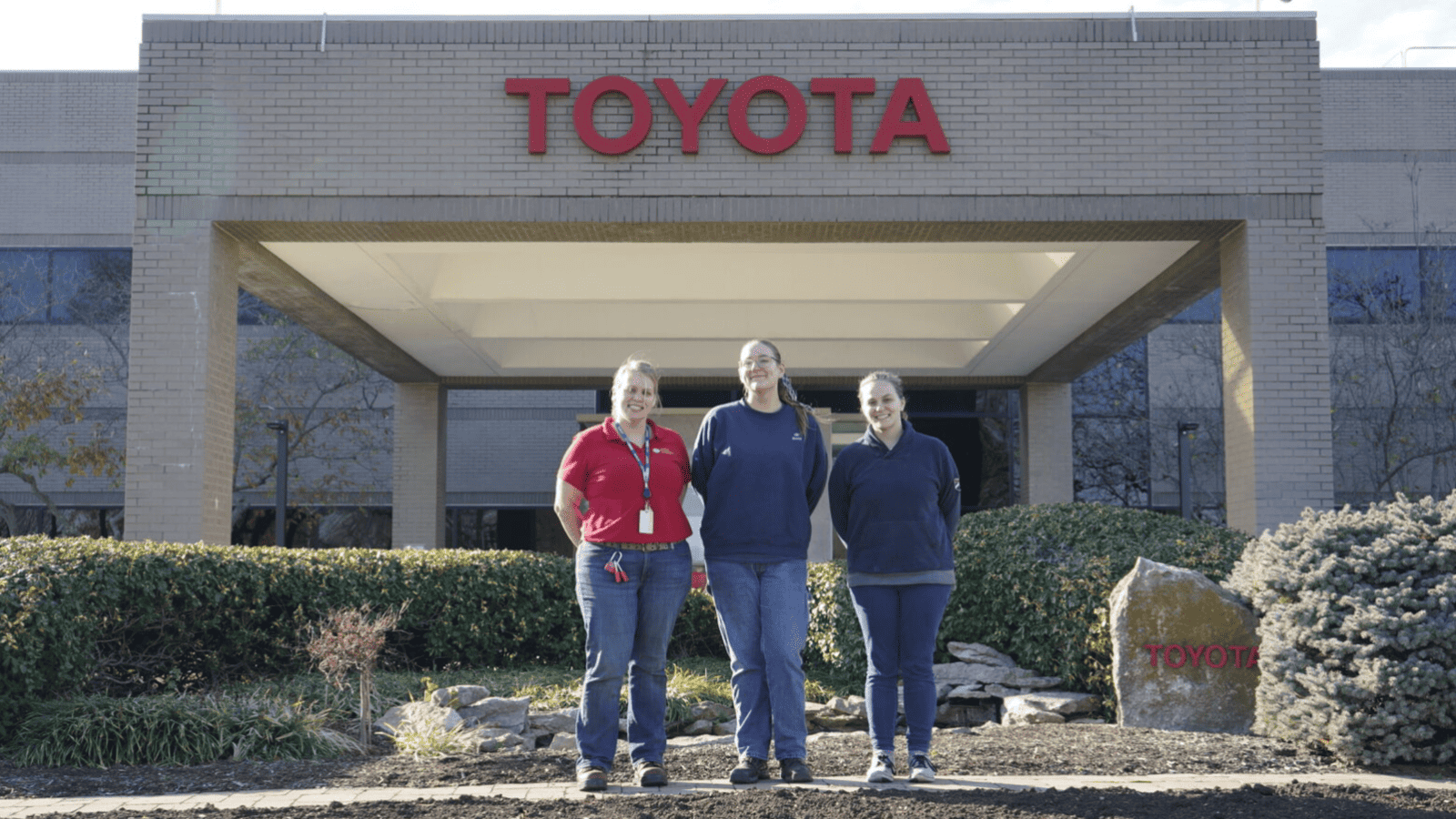
For three sisters in Kentucky, manufacturing is a family affair.
Emily Bastin, Heather Craven and Hannah Geneve are all working in maintenance roles supporting various shops at Toyota Motor Manufacturing Kentucky. Growing up, they had disparate interests—while Emily had taken robotics classes in middle school and Heather had always enjoyed working with her hands, Hannah switched to manufacturing only after working in customer service. Today, all three of them are building careers in manufacturing together.
How they got here: Emily, Heather and Hannah found their way into manufacturing through FAME—an initiative for current and aspiring manufacturing workers that was founded by Toyota in 2010 and is operated today by the Manufacturing Institute, the NAM’s workforce development and education affiliate.
- The FAME Advanced Manufacturing Technician program offers on-the-job training and classroom education that combine technical training with professional practices and lean learnings to create world-class technicians. The two-year AMT program leads to an associate degree and the FAME certificate.
- “They came to my school—the AMT program—and I was like, you know, let’s give this a shot,” said Emily. “I didn’t realize I would have that kind of potential. This was cool stuff.”
The family business: Emily was the first of the three sisters to graduate from FAME, and she has been helping her sisters as they work their way through the program. Both Hannah and Heather are enrolled in FAME while working at Toyota, and they expect to graduate in May 2025.
- “We’re all working in the same plant, and if they need anything from me, I’m there to be supportive,” said Emily.
- “With schoolwork, I try to help Heather, and she tries to help me,” said Hannah. “We all help where we can.”
- “It’s nice to have that sister love to lean on,” said Heather. “They understand the frustration of school and work, and it’s been a pleasure to work with them.”
Opportunities abound: The sisters advise others who might not have considered manufacturing as a career—especially women—to give the industry a second look, emphasizing the sheer diversity of jobs on offer.
- “Working in manufacturing doesn’t necessarily mean you’re working on a factory floor,” said Hannah. “There’s an administrative side, an HR side—there’s a lot more to manufacturing than people expect.”
- “I do see us being examples for women who might not normally see themselves in the field,” said Heather. “You want to see women come in and say, hey, I did it, and you can, too. It’s nice to see yourself reflected back.”
The community: It’s not just their family ties that keep the sisters in manufacturing. All three sisters have high praise for their fellow students and colleagues, and for the supportive culture they’ve encountered at Toyota.
- “The mentorship I got helped me gain my confidence while I was learning,” said Emily. “And even now, the teamwork that goes into everything, every day—it’s been a nice surprise.”
- “Everyone has been super nice, super helpful and super welcoming,” said Hannah. “When you start out, it can seem intimidating, but everyone’s willing to help you out. They really want you to succeed.”
The last word: “It’s nice to feel like you’re a part of that network—that family,” said Heather.
The MI’s 35×30 campaign aims to increase the share of women in manufacturing to 35% by 2030 and spotlights outstanding women in the industry like these sisters. To learn more about Women MAKE America and explore its many opportunities, including its new mentorship program, go here.
The Federation for Advanced Manufacturing Education provides global-best workforce development through strong technical training, integration of manufacturing core competencies, intensive professional practices and intentional hands-on experience to build the future of the modern manufacturing industry. Learn more here.
How One Manufacturer Is Building a Local Talent Pipeline
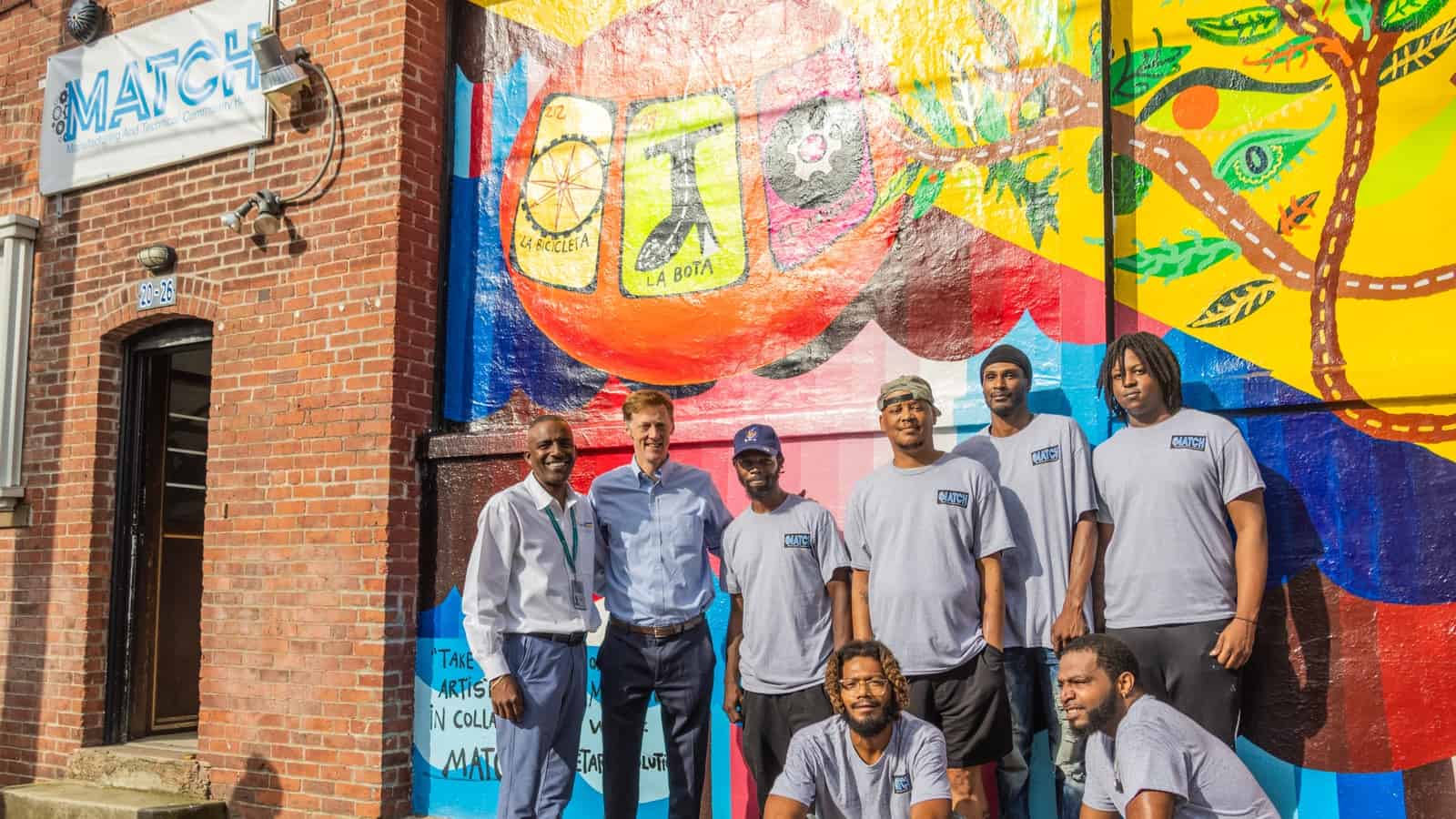
The president of Connecticut-based outdoor lighting manufacturer Penn Globe recently oversaw the launch of a long-awaited passion project: the Manufacturing and Technical Community Hub, or MATCH, a New Haven, Connecticut–area nonprofit contract manufacturing organization and training program designed to fill job openings in the sector.
Seeing a need: “I am a manufacturer, and one of the things I saw missing from the various workforce training programs available was the manufacturers themselves,” LaFemina said. “They weren’t reaching [the participants] in these training programs. So I was a bit frustrated, but that frustration was good … because it led us to create a program with manufacturers training people for actual manufacturing jobs.”
- In 2021, LaFemina and MATCH co-founder Lindy Lee Gold, senior regional manager of the Connecticut Department of Economic and Community Development, secured funding from partners including Lee’s agency, the city of New Haven, the Connecticut Department of Labor and numerous nonprofits.
- This past June, after LaFemina—now MATCH board chair—and the rest of the organization’s board of directors signed a lease on a building, MATCH was born.
How it works: MATCH begins with a two-week, earn-as-you-learn program, offered in both English and Spanish.
- The organization offers training in everything from basic welding to CNC machining, allowing participants to choose the type of manufacturing that interests them most.
- Then, depending on the complexity of their chosen specialty, they may spend up to six additional weeks in paid, on-the-job training before being placed in jobs with local manufacturers.
Meeting the moment: Unlike job-training offerings that expect a certain level of familiarity with an industry, MATCH starts from scratch.
- “Some places say, ‘Let’s test you on something you know nothing about,’” LaFemina told us. “We want to meet the moment. … We’re asking you to come in, give us two weeks and we will pay you minimum wage for the time that you’re here learning.”
- “We’ll figure out what you like and what you’re good at, and as long as we have the workload to make things, you’ll have a job,” she continued.
Being accessible: MATCH also prides itself on seeking out potential employees, instead of waiting to be found.
- “We wanted a building in a specific neighborhood in New Haven,” LaFemina said. “It’s where the majority of the social agencies are, the immigration services, the reentry services. I’d been hearing for two years about how people have [training] programs but couldn’t get participants because [the program locations] were difficult to get to. This one isn’t.”
Family friendly: One of MATCH’s main goals is to reach parents, many of them women, who have left the workforce due to difficulty securing child care. The program’s core hours are 9:00 a.m. to 2:00 p.m., Monday through Friday, in sync with those of most schools.
- MATCH partners are already considering using the program’s New Haven facility as a training site for day care providers, to help alleviate the shortage of workers in that sector.
- In addition, the program’s first cohort of students came from the New Haven Healthy Start’s Fatherhood Involvement project, one of several local initiatives with which the organization has ongoing relationships.
What’s next: MATCH is on track to be financially self-sustaining in three to five years—and LaFemina predicts big growth after that.
- “I see multiple MATCHes down the road,” she said. “There’s already a call for more. My biggest goal is in a few years all of us older people, who leveraged our connections to make this happen, will turn it over to a younger group that will turn it into something even better than it already is.”
Creators Wanted and Union Pacific Dazzle the Twin Cities
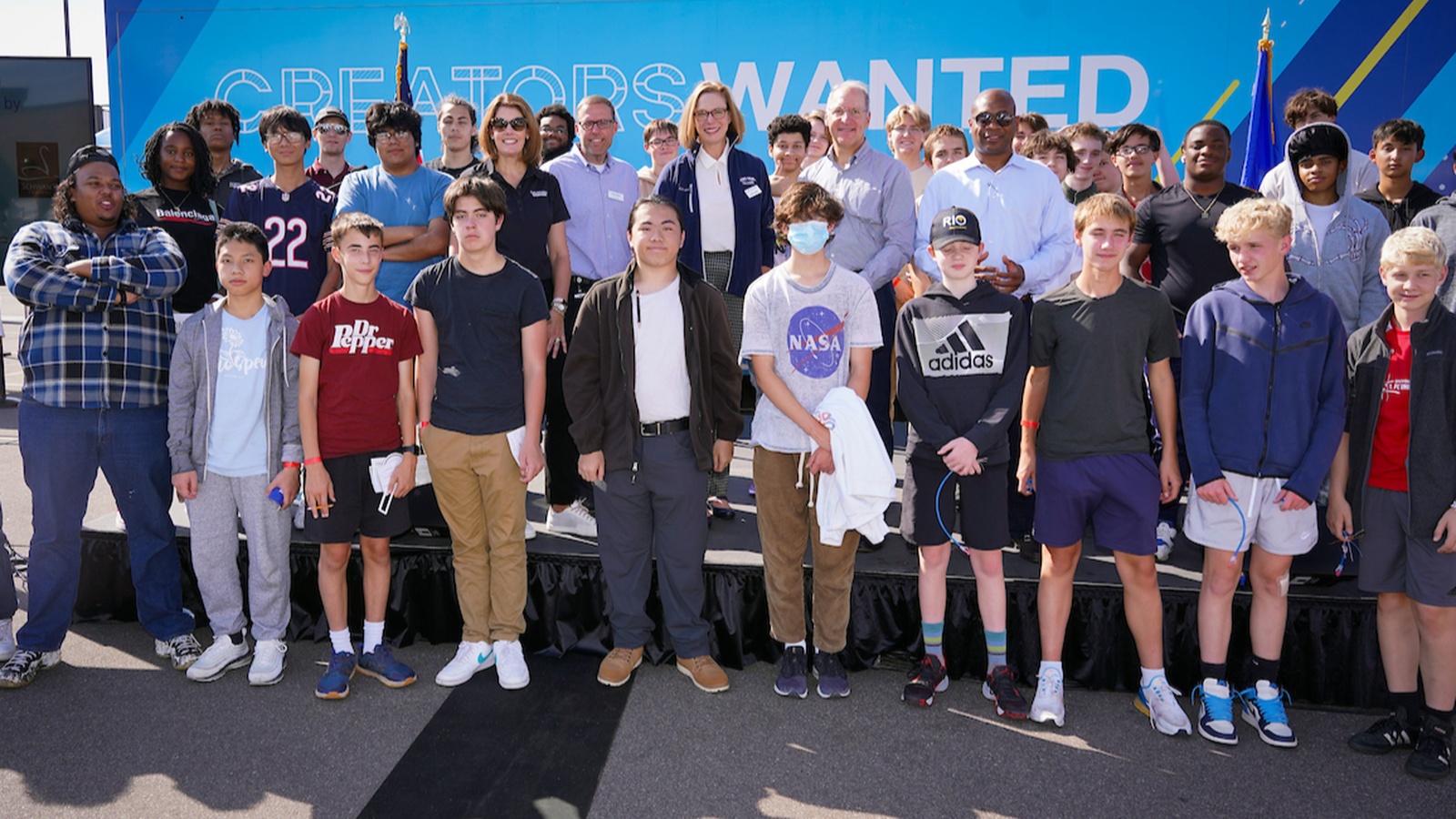
Last week, Saint Paul College in St. Paul, Minnesota, which boasts a student body that is 65% people of color, became the 19th stop of 20 for the Creators Wanted Tour, a joint project of the NAM and the Manufacturing Institute, the workforce development and education affiliate of the NAM.
Over three days, with Union Pacific as the lead sponsor, the stop drew more than 600 visitors, from students to educators. Meanwhile, 42,000 online signups in Minnesota helped the campaign surpass 1.5 million nationwide from students and career mentors interested in modern manufacturing careers.
Twin Cities kickoff: Union Pacific Executive Vice President of Marketing and Sales Kenny Rocker gave the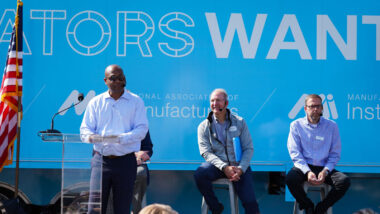 keynote address at the kickoff event, emphasizing the reward of manufacturing careers. He was joined by MI President and Executive Director Carolyn Lee, Saint Paul College President Dr. Dee Dee Peaslee, Minnesota Chamber of Commerce President and CEO Doug Loon and Trane Technologies Vice President of Product Management Dave Molin.
keynote address at the kickoff event, emphasizing the reward of manufacturing careers. He was joined by MI President and Executive Director Carolyn Lee, Saint Paul College President Dr. Dee Dee Peaslee, Minnesota Chamber of Commerce President and CEO Doug Loon and Trane Technologies Vice President of Product Management Dave Molin.
- “When I talk about opportunities, I’m talking about really good-paying jobs … At Union Pacific, we’re talking jobs that are … averaging over $100,000 a year, and that’s without benefits, and so you just really have an opportunity to make an impact from that perspective,” said Rocker.
- “At Trane Technologies, our vision is to boldly challenge what’s possible for a sustainable world,” added Molin. “It is the engine of our company, and we live it every day. And to do that, we need bright minds and the best minds in the world. We need diverse thinkers, we need creators, and our doors are open to everyone.”
- Notably, leaders from key government business and workforce partner organizations attended the kickoff, including the Minnesota State Advanced Manufacturing Center of Excellence, Minnesota Black Chamber of Commerce, Minnesota Parent Union and St. Paul Area Chamber, representatives from the offices of U.S. Reps. Brad Finstad (R-MN-1), Angie Craig (D-MN-2), Dean Phillips (D-MN-3), Betty McCollum (D-MN-4) and Michelle Fischbach (R-MN-7), Mayor of South St. Paul Jimmy Francis and State Reps. Jon Koznick (R), Emma Greenman (D) and Samantha Sencer-Mura (D).
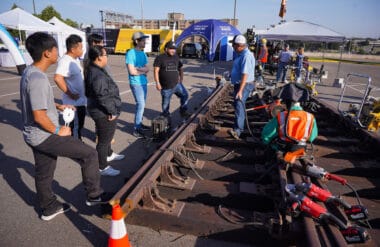
Experience and exploration: Students delved deep into immersive activities, from solving manufacturing-related puzzles in the Creators Wanted mobile experience to virtually navigating a locomotive through Union Pacific’s simulators. Equally captivating was the sight of the actual railroad track, which was complemented by insightful career anecdotes from Union Pacific professionals.
- Eighty-seven percent of students surveyed reported a significantly improved view of modern manufacturing careers after completing the immersive experience.
Live Q&A sessions: The stop also offered structured opportunities for students to learn about manufacturing organizations’ support for the next generation of talent, along with the importance of mentorship and personal development in shaping successful careers.
- The first session, featuring two Union Pacific senior managers—Amy Bang, Sr. manager of diversity and inclusion, and Ken Kuwamura, Jr., manager of talent acquisition—and Saint Paul College instructors, zeroed in on the crucial roles of mentorship, diversity and passion in career selection.
- The second session, with Jake Yernberg, automotive instructor, Saint Paul College; Caitlin Bundy, manager of corporate sustainability, Union Pacific; and Preeti Subramanian, senior product manager, Trane Technologies, accentuated the pivotal role of manufacturing in tackling global challenges. Panelists pointed out the advantages of the manufacturing sector, citing competitive pay and the sector’s potential in addressing global issues, such as sustainability and climate change.
Interactive Learning: Everfi®, Ecolab and Schwan’s joined Union Pacific in bringing in representatives to give students career advice—and offer activities to spark their curiosity.
- Everfi® showcased a new digital education program, “Future Creators,” co-developed with the MI and Union Pacific, to give middle and high school students a peek into STEM careers.
- Saint Paul College also took students on a tour of its robust Trades and Technical Education program.
Beyond the Tour: The Twin Cities event is a part of Union Pacific’s overarching “Careers on Track” initiative, which aims to inspire more women and youth to pursue modern industrial careers, and the Creators Wanted campaign’s sustained drive to enhance perceptions of manufacturing careers in the United States and empower more people to create the future.
The last word: “I want all of you out here, the students, to have an opportunity to go out there and win and compete and further your careers and do well in life,” said Rocker, echoing a theme the Creators Wanted Tour has promoted since its inception: manufacturers and manufacturing care about students and their future.
Next up: The pioneering Creators Wanted Tour concludes next month, Oct. 17–21, at the Circleville Pumpkin Show in Circleville, Ohio.
